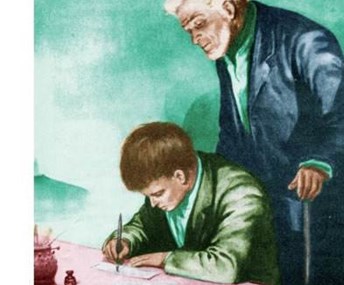Garoffi interrupted the teacher to inquire if it was true that blind boys learn to reckon better than others.
卡洛斐把先生的话头打断,问盲人是否真的工于计算。
The master replied: "It is true. They learn to reckon and to write. They have books made on purpose for them, with raised characters; they pass their fingers over these, recognize the letters and pronounce the words. They read rapidly; and you should see them blush, poor little things, when they make a mistake. And they write, too, without ink. They write on a thick and hard sort of paper with a metal bodkin, which makes a great many little hollows, grouped according to a special alphabet; these little punctures stand out in relief on the other side of the paper, so that by turning the paper over and drawing their fingers across these projections, they can read what they have written, and also the writing of others; and thus they write compositions: and they write letters to each other. They write numbers in the same way, and they make calculations; and they calculate mentally with an incredible facility, since their minds are not diverted by the sight of surrounding objects, as ours are. And if you could see how passionately fond they are of reading, how attentive they are, how well they remember everything, how they discuss among themselves, even the little ones, of things connected with history and language, as they sit four or five on the same bench, without turning to each other, and converse, the first with the third, the second with the fourth, in a loud voice and all together, without losing a single word, so acute and prompt is their hearing."
“真的啰。他们也学算法与读法。读本也有,那文字是突出在纸上的,他们用手摸着读,读得很快呢!他们也能写,不用墨水,用针在厚纸上刺成小孔,因了那小孔的排列式样,就可代表各个字母。只要把厚纸翻身,那小孔就突出在背后,可以摸着读了。他们用此作文、通信,数字也用这方法写了来计算。他们心算很巧,这因为眼睛一无所见、心专一了的缘故。盲孩读书很热心,一心把它记熟,连小小的学生也能互相议论历史、国语上的事情。四五个人在长椅上坐了,彼此看不见谈话的对手在哪里,第一位与第三位成了一组,第二位与第四位又成了一组,大家提高了声音间隔着同时谈话,一句都不会误听。”

"And they attach more importance to the examinations than you do, I assure you, and they are fonder of their teachers. They recognize their teacher by his step and his odor; they perceive whether he is in a good or bad humor, whether he is well or ill, simply by the sound of a single word of his. They want the teacher to touch them when he encourages and praises them, and they feel of his hand and his arms in order to express their gratitude. And they love each other and are good comrades to each other. In play time they are always together, according to their wont. In the girls' school, for instance, they form into groups according to the instrument on which they play,--violinists, pianists, and flute-players,--and they never separate. When they have become attached to any one, it is difficult for them to break it off. They take much comfort in friendship. They judge correctly among themselves. They have a clear and profound idea of good and evil. No one grows so enthusiastic as they over the narration of a generous action, of a grand deed."
“盲童比你们更看重试验,与先生也很亲热。他们能凭借步声与气味认识先生。只听了先生一句话,就能辨别先生心里是高兴或是懊恼。先生称赞他们的时候,都来扳着先生的手或臂,高兴喜乐。他们在同伴中友情又极好,总在一处玩耍。在女子学校中,还因乐器的种类自集团体,有什么提琴组、钢琴组、管乐组,各自集在一处玩弄。要使她们分离是不容易的事。他们判断也正确,善恶的见解也明白,听到真正善行的话,会发出惊人的热心来。”
Votini inquired if they played well.
华梯尼问他们是不是善于使用乐器。













